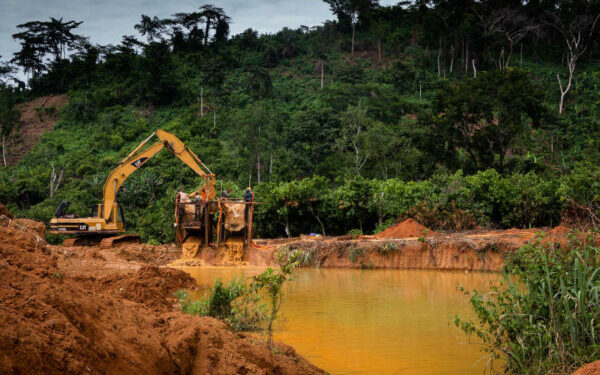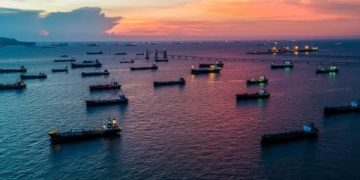Ghana’s War on Illegal Mining Has Failed – We Set Out to Find Out Why
Early in his eight-year tenure, in 2017, then Ghanaian president Nana Akufo-Addo declared a moratorium on all small-scale gold mining. He established an inter-ministerial committee on illegal mining and a joint military-police taskforce – Operation Vanguard – to enforce the ban.
The tough measures aimed to reduce the severe environmental degradation caused by illegal small-scale gold mining, known as “galamsey”. Initially for six months, the ban lasted for 20 months until December 2018, when it was lifted for newly registered miners.
But illegal mining continued unabated. A statement made in Ghana’s parliament by the country’s lands minister outlined the scale and gold production from small-scale mining increased during the period of its ban.
As political scientists, we investigated why the government-declared “war” on illegal small-scale gold mining and associated environmental degradation failed so spectacularly.
We conducted our investigations through field visits to communities in mining areas in the western and central regions of Ghana. We interviewed small-scale miners, community residents and people affected by illegal mining. We followed this up with a review of official reports, published scientific research and media reports.
We concluded from findings that the involvement of government officials and business elites in illegal mining practices was behind the failure of the interventions. We describe this as “democracy capture”. We argue that, despite Ghana’s much-vaunted electoral democracy, the country’s democratic processes and institutions have been captured by political and economic elites for their own personal enrichment.
Scandals
By mid-2023 a series of corruption scandals had emerged around Ghana’s attempt to curb illegal mining. These included the release of an undercover investigation by journalist Anas Aremeyaw Anas. Machinery seized by the military from illegal mining sites went missing under mysterious circumstances. Also, military personnel assigned to protect forest reserves were accused of becoming a protection racket for illegal miners.
In April 2023, the scandals peaked. A report on the work of the inter-ministerial committee by its former chair, Kwabena Frimpong-Boateng, was leaked. It detailed the involvement of high-level government and ruling party officials in illegal and environmentally destructive mining at a time when all mining was banned.
The report was submitted to government in 2021 but didn’t become public until it was leaked. No clear official statement was issued about the report, but some government officials attempted to discredit and challenge its findings.
The scandals brought fresh attention to the fact that the government’s policies to curb illegal mining had failed. This failure is indicated by the official gold production figures from small-scale mining during the moratorium period. In 2017, production held steady at almost 1.5 million ounces and then in 2018 increased to its highest level ever at almost 2 million ounces, precisely when the ban was in place. Small-scale output in 2018 was 41.4% of total gold production, higher than any previous year. These figures question the extent to which the moratorium on mining was enforced. It indicates that mining continued throughout the purported ban.
Democracy capture and elite enrichment
The objective of democracy capture is to appropriate the benefits of state control for purposes of personal enrichment. It goes beyond individual acts of opportunistic corruption. It entails systematic processes of capture by political elites organised in established political parties who act alongside associated business elites. Importantly, the benefits go beyond the appropriation of state resources. It include private financial gains from illicit activities with state protection.
Although we focus on the government under Akufo-Addo (2017-2024), our contention is that “democracy capture” in Ghana extends to the two main political parties.
We analyse how this has come about. We also set out the implications for democracy in Ghana, and what can be done to reverse the trend.
Elements of democracy capture are evident in the various scandals and corrupt practices that were exposed during the government’s ostensible campaign against illegal mining. The scandals expose an organised network at the highest level of government. It includes politicians, officials and senior ruling party members.
How democracy capture works
First, the presidency and its chief of staff appear to have played a role in controlling operations and protecting those exposed. The chief of staff as a political appointee from the ruling party, rather than a career civil servant, is crucial to strengthening the link between the executive and the ruling party. Additionally, senior party members are appointed to key roles within the presidency.
Second, there is tight party control over relevant state agencies. For example, a former general secretary of the governing party was appointed as CEO of the Forestry Commission (a key regulator in the issuance of mining licences).
Third, the loyalty between members of the party elite has been highlighted by the high-level protection from prosecution and conviction when criminal activities are exposed. The case of Charles Bissue is an example. A top official of the inter-ministerial committee on illegal mining and prominent member of the governing party, he was caught on camera in the undercover investigation. He was charged with corruption but six years later the case still hasn’t been concluded.
Fourth, the military and law-enforcement agencies are allowed to benefit from illicit activities. They can sell confiscated equipment and take bribes to protect illegal mining sites. An official investigation found that the police also habitually did this.
What next?
Ghanaians value political stability and civil liberties. However, the capture of democracy has become a path to personal wealth for the political elite and their business associates.
Elites have been able to act outside the law with relative impunity. The consequence of democracy capture is that socio-economic development is sidelined. Wealth cascades upwards and inequalities intensify. Our study clearly identifies these elements.
Combating democracy capture will require a major effort from civil society organisations and the media, to expose government and state involvement in these illegal activities. This must go hand in hand with a stronger legal and judicial regime committed to prosecutions.
The current attorney general has ordered an investigation into Frimpong-Boateng’s report, but we await to see what action, if any, will be taken.









More of such public service articles. Civil society groups and the few good journalists should never give up otherwise we are doomed as a country.
How does the average citizen suppport the work of civil society groups?